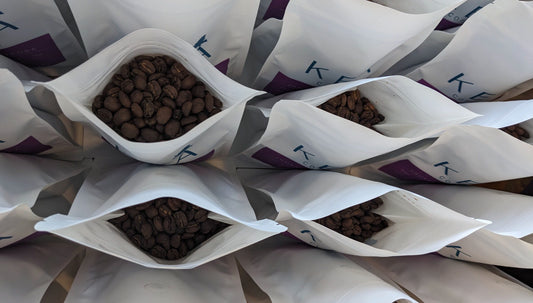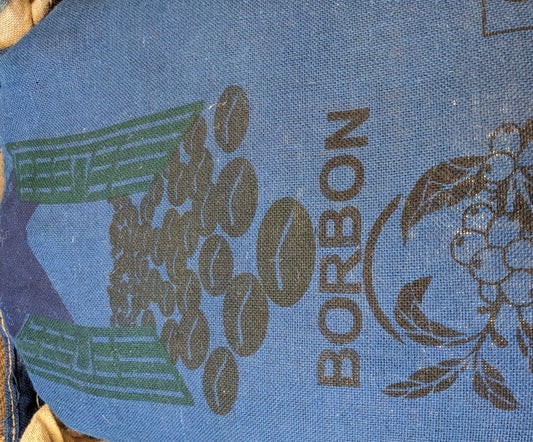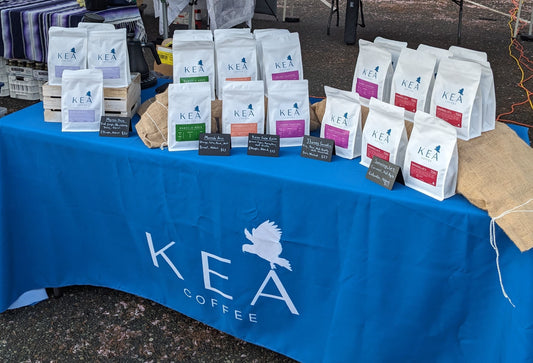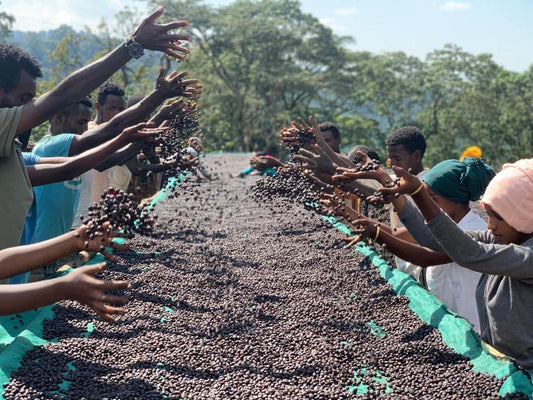One of the things that makes coffee so fun, for us, is the huge range of flavour possibilities to be explored.
The way we brew can have a huge effect on the flavours in your cup. Take a look at our Layo Teraga 3 ways post, for example, where we get 3 quite different cup profiles from the same Ethiopian natural.
But even before a coffee makes its way into your grinder, there's a bunch of variables that all impact what flavours you'll be able to extract.
Origin.
Processing method.
Roast degree and style.
And of course... varietal.
In todays post, we're going to take a closer look at 3 of the most intriguing coffee varietals to watch out for.
What varietals are popular in coffee competitions right now?
One great place to look to for insight into lesser known or up and coming varietals, can be coffee competitions.
The varietals used by competitors are (like every single other thing in competition routines) carefully and purposefully selected.
Maybe they have particular qualities or an intriguing back story. Or maybe they're grown in a new and emerging coffee growing origin or region.
Whatever the reason, unusual varietals that get heavy focus in competitions, usually have a way of making their way into the market more broadly.
So here's our look at 3 fun and unusual coffee varietals from recent competitions, that you might well start to see a little more of in the years to come.
Papayo
Common Origins: Currently grown almost entirely in Columbia. Mostly in Huila and some in Tolima region.
Common Processing: Mostly washed processed, although some producers are experimenting with naturals and even experimental coffee processing methods.
Characteristics: Vibrant tropical acidity. Balanced stone fruit sweetness.
Huila used to be the home of a coffee research station project, which has since shut down.
A lot of different interesting and unique varietals are grown in and around Huila today, left behind by the research station which was dedicated to cultivating many different varietals from other origins around the world.
Papayo itself is thought to be descendant from Ethiopian Landrace, although its exact origins are unknown.
In the handful of times we've seen this varietal on the shelves, it's always been packed full of tropical fruit notes like pineapple, mango and passionfruit, plenty of acidity and a balanced sweetness of stone fruits like plum, peach and cherry.
Eugenioides
Common Origins: Columbia. Mostly only at well known farms like Finca la Immaculada. Originally evolved in East Africa in the mountains of Rwanda, Kenya, Uganda, Tanzania and the DRC.
Common Characteristics: High sweetness. Low acidity. Low caffeine content. Low bitterness (potentially due to low caffeine content). Expect some very unusual flavour notes. We've seen notes like toasted marshmallows, lemon drops and cereal milk.
We're cheating a bit with this one.
You see... virtually all of the coffee we drink in specialty, are varietals (or types of) Arabica.
But Eugenioides isn't actually a varietal.
Eugenioides is a species. Just like Arabica and Robusta.
In fact, Eugenioides is one of the parent species of Arabica. Robusta being the other.

Photo credit: Cafe Imports
Eugenioides originally evolved in East Africa, where the high mountain terrain of Rwanda, Kenya, Burundi, Uganda and even Tanzania allowed it to evolve with some interesting genetic traits.
One of those genetic traits, is that it actually has very low caffeine content, which makes it a great alternative for anyone craving to make good decaf coffee.
Thanks to a genetic mutation, Eugenioides produces about half as much caffeine as most Arabica coffees.
Even though it's nowadays somewhat of a "forgotten species", Eugenioides is gradually starting to pick up some notable mentions thanks to its very unusual flavour profiles.
Eugenioides put itself firmly back on the coffee map, when it was used by both the 2021 World Barista Champion Diedo Campos and the 2021 World Brewers Cup winner Matt Winton in their winning routines.
Actually... it was used by 3 different national level champions in the 2021 WBC.
Here's Diedo's winning WBC routine with Eugenioides, where he highlights notes of papaya, mango, passionfruit, blackberry, cacao nibs, malt (!!) and brown sugar:
There still aren't many farmers producing Eugenioides, so don't expect to see it on heaps of menus any time soon. But if you do see it, it's well worth a closer look!
Pink Bourbon
Common Origins: Colombia. Mostly around the Huila region.
Common Processing: Experimental processing techniques such as different types of anaerobic fermentation are becoming increasingly popular, as more producers look to push the boundaries and experiment with this versatile varietal. You can still find plenty of washed or even natural processed Pink Bourbons around though too.
Common Characteristics: Salmon pink colored cherries (hence the name) that produce complex flavour profiles. Lots of florals, sweet and layered cups with lots of nuance.
Of all of the many many varietals that make up the diverse world of specialty coffee, Pink Bourbon is probably the one making the biggest ripples across both competition and retail right now.
Pink Bourbon is a type of Bourbon that has been steadily growing in popularity over recent years.
Most recently, we saw this at competition level when both Boram Um and Isaiah Sheese used a Pink Bourbon varietal in their sets at the finals of WBC 2023.
But we see it too at retail, with more and more roasters adding Pink Bourbons to their menus.
Pink Bourbon is another Ethiopian Landrace descendant, often with a very complex and nicely sweet flavour profile.
Just like Papayo, it's exact origins are unknown, and these days it's mostly grown around the Huila region of Colombia.
Yep... if you weren't intrigued about that old coffee research station before, I bet you are now!
Pink Bourbon is usually quite floral, and you'll often see tasting notes like jasmine, green tea and rose mixed in with those tropical and stone fruit sweet notes.
All of this builds complexity into the coffees and results in a cup that's often somewhat similar to a good Panama Gesha or a washed Ethiopian.
Ready to try some new single origin varietals?
Our single origin subscriptions are the best way to experience a variety of varietals, from some of the best origins and producers around the world.
Sign up for a subscription today, and use the code "Huila10" for 10% off your first months subscription!





